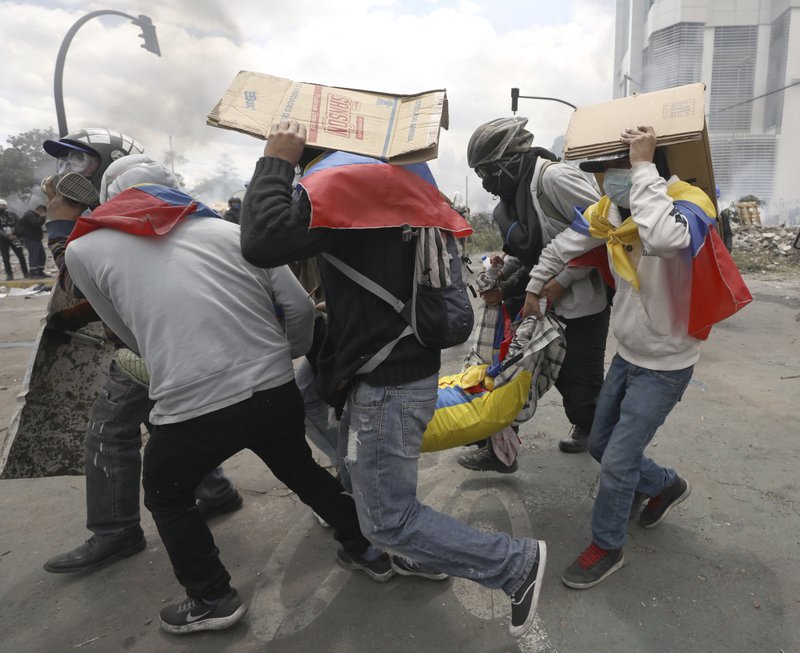QUITO, Ecuador -- President Lenin Moreno ordered the army onto the streets of Ecuador's capital Saturday after a week and a half of protests over fuel prices devolved into violent incidents, with masked protesters attacking a television station, newspaper and the national auditor's office.
Moreno said the military-enforced curfew would begin at 3 p.m. local time in response to violence in areas previously untouched by the protests. Around 1 p.m., masked protesters broke into the national auditor's office and set it ablaze, sending black smoke billowing across the central Quito park and cultural complex that have been the epicenter of the protests.
About two hours later, a group of several dozen masked men swarmed the offices of the private Teleamazonas television station in northern Quito, set fires on the grounds and tried to break into the building where about 20 employees were trapped, one employee told The Associated Press by telephone on condition of anonymity because he was afraid of retaliation.
A journalist with the newspaper El Comercio told the AP that the paper's offices in southern Quito were also under attack. The building's security guards were seized and tied up, and attackers were trying to break into offices where journalists were hiding, the journalist said, under condition of anonymity for fear of retaliation.
Moreno appeared on national television alongside his vice president and defense minister to announce that he was ordering people indoors and the army onto the streets.
He blamed the violence on drug traffickers, organized crime and followers of former President Rafael Correa, who has denied allegations he is trying to topple Moreno's government.
Moreno said the masked protesters had nothing to do with the thousands of indigenous Ecuadorians who have protested for nearly a week over a sudden rise in fuel prices as part of an International Monetary Fund-backed austerity package.
"I have ordered the Armed Forces Joint Command to immediately undertake all the necessary measures and operations," Moreno said. "We are going to restore order in all of Ecuador."
The violence, curfew and military deployment came shortly after the announcement of a possible softening of Ecuador's 10-day standoff.
Indigenous leaders of protests that have paralyzed Ecuador's economy for nearly a week said Saturday they were willing to negotiate with Moreno over the austerity package.
The Confederation of Indigenous Nations of Ecuador said on its Twitter account that after internal discussion "we have decided to participate in direct dialogue" with Moreno.
Minutes after that tweet, Leonidas Iza, a Quechua leader from mountainous Cotopaxi province, told Ecuavisa television that "we have asked for minimal conditions for dialogue," including what he called an end to government violence against protesters.
Previously, indigenous protesters had refused to negotiate until Moreno restored fuel subsidies.
Quito Mayor Jorge Yunda said Moreno was willing to revise the package and planned to meet Saturday with leaders of the demonstrations.
Moreno eliminated a subsidy on the price of fuel on Oct. 2, driving the most popular variety of gasoline from $1.85 to $2.39 a gallon and diesel from $1.03 to $2.30. Panic and speculation sent prices soaring, with costs of some products doubling or more.
Ecuador's indigenous people, wracked by poverty and underserved by government programs, were infuriated. Over the past week, thousands of Shuar, Saraguro, Quechua and other indigenous people streamed into Quito from deep in the Amazon rain forest and high in the towns and villages of the Ecuadorian Andes.
The indigenous leaders have distanced themselves from the violent gangs, calling them instigators unconnected to the native groups' cause.
An indigenous leader and four other people have died in clashes with authorities, according to the public defender's office. The president's office has reported two deaths. Hundreds of protesters have been injured and hundreds more briefly detained.
Information for this article was contributed by Raisa Avila of The Associated Press.
A Section on 10/13/2019
